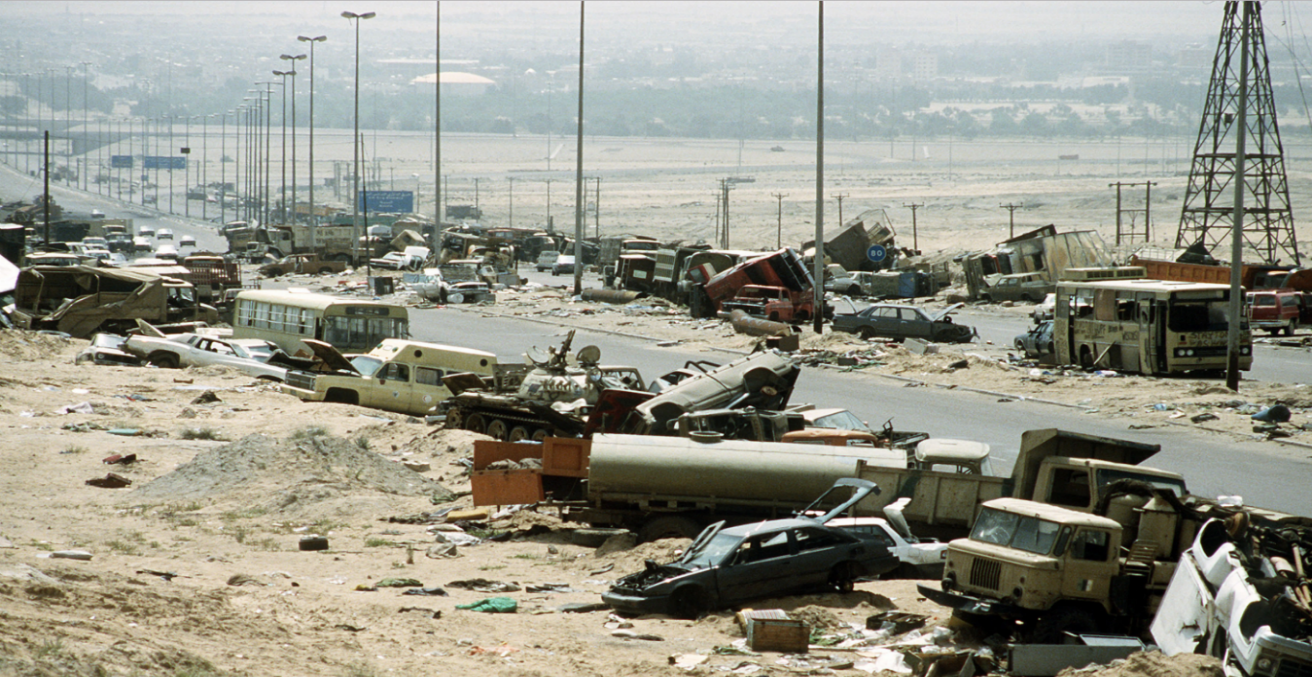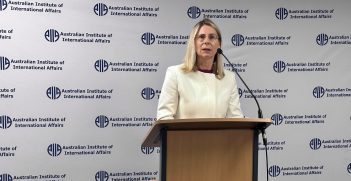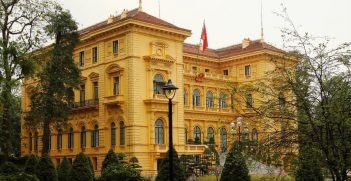Remembering the Gulf War

On 2nd August 28 years ago, Iraq invaded Kuwait amid the uncertainty of the changing post-Cold War international order. What were the key events and justifications for Australia’s involvement?
28 years ago, amid the uncertainty of the changing post-Cold War international order, Iraq invaded Kuwait on 2 August 1990. What began as the Persian Gulf crisis transitioned to the Gulf War (17 January – 28 February 1991) as a US-led, UN-authorised coalition forced Iraq to withdraw from Kuwait. What were the key events and justifications for Australia’s involvement?
The invasion
The Iraqi invasion occurred following months of dispute over the debt Iraq owed Kuwait for its war with Iran. The dispute was exacerbated by conflict over oil production and prices, the desire to obtain a sea port from Kuwaiti territory and historical disagreement over their border, which was set by colonial powers post-World War I. The Baathist regime, led by President Saddam Hussein, may have been emboldened by a meeting Hussein had with the US Ambassador in late July. The US ambassador said that the US had ‘no opinion’ on the dispute between the neighbours.
Regardless of whether there was a misunderstanding, the international condemnation was swift and almost unanimous. The United Nations Security Council (UNSC) condemned the invasion and demanded an immediate withdrawal. US President George H.W. Bush ordered immediate economic sanctions, announced Operation Desert Shield, lobbied allies to participate in a US-led naval blockade to enforce sanctions and negotiated deploying troops in Saudi Arabia to defend it from Iraqi attack.
Australia’s Labor Prime Minister, Bob Hawke, told Parliament that the invasion provoked one of the gravest international crises since World War II. Australia imposed sanctions on Iraq and Kuwait on 6 August, just hours before the UNSC authorised mandatory economic and trade sanctions.
Australia’s involvement
On 10 August 1990, after consulting five ministers, Hawke announced Australia would send three ships to the Gulf as part of the US-led multinational task force to enforce sanctions. This decision pre-empted the UNSC authorisation of sanction enforcement by two weeks. There was confusion at the time about whether Australia’s commitment was in response to a request from President Bush. However, it appears that Bush’s telephone call came at the end of the process initiated by Australian officials in Washington.
Australia’s involvement in both the crisis and the war had bipartisan support. The Liberal-National party opposition, led by Dr John Hewson, was critical of the strength of commitment and decision-making process, but overall supportive of the policies.
Reasons for Australian participation
The reasons given for Australian participation centred on representations of Australian identity as a principled, sovereign, democratic nation-state. This identity was contrasted with that of Iraq, especially Hussein. His undeniable abhorrent historical and contemporary political practices facilitated his demonisation as the personification of evil. He was likened to a Hitler figure who shouldn’t be appeased. Combating the threat he posed became a justification in itself that avoided acknowledging the previous relationship the West had had with him.
Other justifications for participating included the invasion’s threat to oil markets and prices, which threatened Australia’s vital interests through its trading partners. Connected to this was the impact the invasion would have on Middle Eastern stability and its pivotal place in the global economy. Secondly, the invasion was simultaneously represented as a threat to the post-Cold War new world order and as an opportunity to construct a new world order in which the UN could be revitalised via collective security, for which Australia had a responsibility as a foundational UN member. Thirdly, the Iraqi invasion exemplified the threat characterised in Australia’s strategic outlook at the end of the Cold War of increased regional instability as middle powers, no longer constrained by superpower rivalry, pursued more aggressive policies. The specific concerns were that the lack of unifying regional organisations made the Asia-Pacific more susceptible to instability and the possibility of decreased American engagement in the region.
The war
Although the CIA had reported sanctions to be working with 90 per cent of Iraq’s imports and 97 per cent of exports stopped, by November 1990 the efficacy of sanctions was questioned: they were not working quickly enough, if at all, to force Iraq’s withdrawal. The ‘failure’ of sanctions developed into an argument for the use of force and the credibility of the UN being reliant upon its capacity to have ‘teeth’. On 29 November, UNSC Resolution 678 authorised the use of ‘all necessary means’ to expel Iraq from Kuwait if it didn’t withdraw by 15 January the next year.
Iraq didn’t meet the deadline and on 17 January, the US-led forces launched the first airstrikes of Operation Desert Storm. While the Australian forces co-operated in the military operations, perhaps the most significant Australian contribution was the intelligence provided by the joint facilities at Nurrungar and Pine Gap, particularly in the detection of Iraqi Scud missiles.
The ground offensive began on 24 February after another deadline for withdrawal passed. The Iraqi forces were overwhelmed by technological superiority and outnumbered in the air and ground wars. This called into question claims about it being a Just War, especially in terms of proportionality. It produced infamous imagery, such as the retreat of Iraqi soldiers on the ‘Highway of Death’ into Basra, labelled a ‘turkey shoot’. Phrases such as ‘collateral damage’ and ‘surgical strikes’ entered the popular lexicon and media coverage was criticised for being too controlled by the military and treating the war as entertainment.
A cease fire began on 28 February, Kuwait’s territorial integrity was restored and Hussein remained in power in Iraq. More than 100,000 Iraqi soldiers died, possibly 150,000 deserted and estimates of civilian deaths are between 100,000 – 200,000. Losses for coalition forces were approximately 300 and there were no deaths amongst the more than 1800 Australian personnel.
Remembering the war
In Australia, the war was celebrated as a victory for international cooperation and a successful demonstration that larger power aggression against smaller powers would be countered. Hopes about collective security and a new world order, like the war, were short-lived.
Australia’s military contribution was unnecessary, however political leaders represented the political contribution of early support for US-led military intervention as significant. Hawke was proactive in offering the US political and military assistance and similar commitments of support to the US by subsequent prime ministers indicate the Hawke government’s response aligned with the Australian tradition of cultivating ‘great and powerful friends’ for (future) security guarantees.
Australia’s support for the US and its pre-emption of the UN can further be understood by the focus of its strategic outlook on regional instability. The Gulf crisis represented an opportunity for Australia to pursue both ‘collective security’ and alliance politics with the objective of strengthening Australia’s security and maintaining strong US engagement in the Asia-Pacific region.
As a short, victorious war, without Australian casualties, the Gulf War is often overlooked and not subject to the same kinds of public remembrance ritual as Australia’s other wars. Perhaps its most significant political contribution to the broader foreign policy sphere is as the precursor to the 2003 Iraq war. When the Gulf War is remembered, it is usually through the lens of the later war.
Lisa Barritt-Eyles is a PhD candidate at the University of Newcastle. She is studying the justifications for Australia’s participation in war in the post-Cold War era.
This article is based on doctoral research and a paper titled, ‘Discourses of Justification: Australia, the Persian Gulf War and the New World Order’, presented at the International Political Science Association 25th World Congress, 21-25 July 2018, Brisbane.
This article is published under a Creative Commons Licence and may be republished with attribution.





